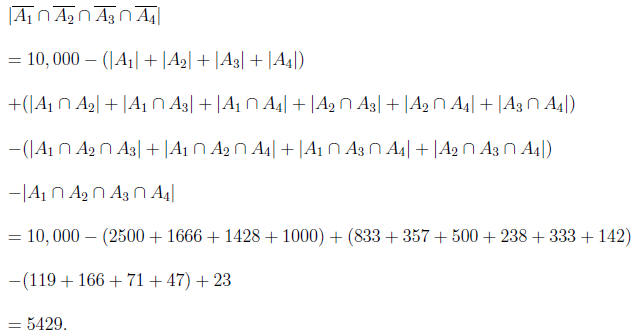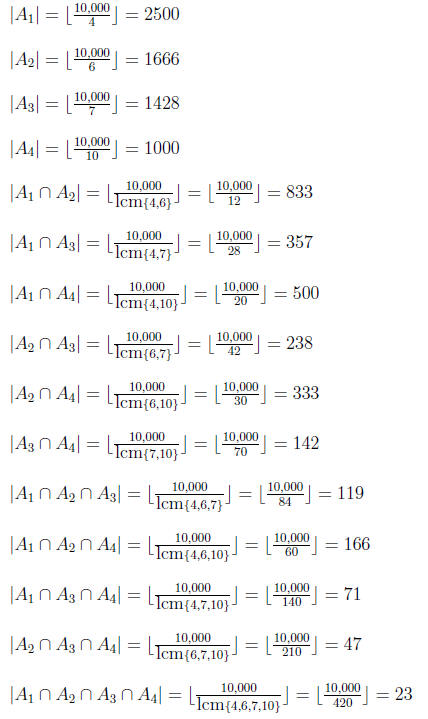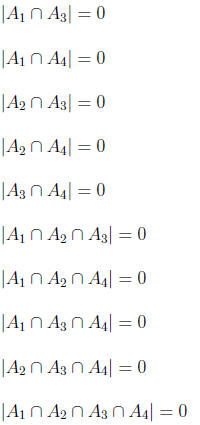MATH 145: Homework Solutions #6
1. Brualdi 6.2
Find the number of integers between 1 and 10,000 inclusive which are not
divisible by
4,6,7, or 10.
Answer:
Let  be the set of integers between 1 and
10,000 that are divisible by 4,
be the set of integers between 1 and
10,000 that are divisible by 4,  be the
be the
set of integers between 1 and 10,000 that are divisible by 6,
 be the set of integers
be the set of integers
between 1 and 10,000 that are divisible by 7 and let
 be the set of integers between
be the set of integers between
1 and 10,000 that are divisible by 10. Then by the inclusion-exclusion principle
the
number of integers between 1 and 10,000 inclusive which are not divisible by
4,6,7, or
10 is

because:

2. Brualdi 6.3
Find the number of integers between 1 and 10,000 which are neither perfect
squares
nor perfect cubes.
Answer:
Let S = {1, 2, ..., 10000} be the set of all integers between 1 and 10,000. Then
|S| =
10000. Let ![]() be the set of all perfect squares in S . Then
be the set of all perfect squares in S . Then
 since
since
all integers less than 100 and their perfect squares are in S . Let  be the set
of all
be the set
of all
perfect cubes in S . Then  since 9261 is the
largest number that
since 9261 is the
largest number that
is a perfect cube in S . Now  are integers in
S that are both perfect squares
are integers in
S that are both perfect squares
and perfect cubes. Therefore if n is in  , and
the prime factorization of n is
, and
the prime factorization of n is
 then each exponent
then each exponent  is divisible by 6. That is
is divisible by 6. That is  are integers
are integers
in S that are 6 th powers of an integer . The largest integer which is 6th power
in S is
4096. so  .
.
Therefore by the inclusion-exclusion principle we have the number of integers
between
1 and 10,000 which are neither perfect squares nor perfect cubes is

3. Brualdi 6.7
Determine the number of solutions of the equation
 in
non-negative
in
non-negative
integers  and
and
 not exceeding 8.
not exceeding 8.
Answer:
Let S be the set of all non- negative integral solutions of the equation
 .
.
Then, the number of non-negative integral solutions of the given equation
is ,

Let the set ![]() consist of solutions in S for which
consist of solutions in S for which
 We make a change of
variable ,
We make a change of
variable ,
 to get|
to get|![]() | which is the same as the number of non-negative solutions
of
| which is the same as the number of non-negative solutions
of
the equation  . Therefore
. Therefore

Similarly, if we let
![]() be the set of solutions in S for
which
be the set of solutions in S for
which  ,
,  be the set of
be the set of
solutions in S for which  and
and
![]() be the set of solutions in S for which
be the set of solutions in S for which
 ,
,
we get

The set  consists of solutions in S which have
consists of solutions in S which have
 and
and  . Let
. Let
 . Then, |
. Then, | | is the same as the non-negative
integral
| is the same as the non-negative
integral
solutions of the equation

Thus, | | = 0. Similarly, we can easily verify that
| = 0. Similarly, we can easily verify that

By inclusion-exclusion principle we get that the number of
solutions of the equation
![]() in non-negative integers
in non-negative integers
![]() and
and
![]() not exceeding
8 is
not exceeding
8 is

(It is quite obvious that the sets
![]() , . . . ,
, . . . ,![]() are
disjoint because if two numbers are
are
disjoint because if two numbers are
greater than 8, then the sum of them together with other non-negative integers
exceeds
14. Thus 680 − 4 × 56 = 456.)
| Prev | Next |